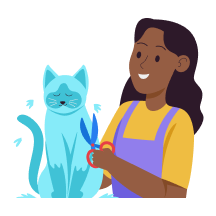What Is The Difference Between Kitten And Cat Food
If you’re new to the world of pet parenting, you’ve probably stood in front of a pet food shelf wondering: “Wait, isn’t food just food? Why does my tiny fluffball need something different from that full-grown, judgmental cat on the sofa?”
You’re not alone. It’s one of the most common questions we get from cat owners in Bangladesh. So let’s break it down. No jargon, no confusion, just real talk about kitten food vs. adult cat food.
Why Kittens and Cats Need Different Foods
Think of a kitten as a growing child. Now, would you feed a baby the same ‘kala vuna’ you’d give a grown man? Exactly. Kittens need more protein, fat, and calories because they’re in turbo growth mode.
Their tiny bodies are working overtime while building muscles, developing bones, and figuring out how to meow for snacks every 20 minutes.
On the other hand, adult cats are more like that office-going uncle who needs a balanced diet to maintain his current shape, not outgrow it.
Too many calories? They get chubby. Too little? They lose energy. That’s why cat food is designed with a different set of needs in mind.
Protein, Fat, and That Extra Energy Boost
-
Kitten food = High-energy fuel. It’s packed with protein and fat to support rapid growth. Many also include DHA, a type of omega-3 fatty acid important for brain and eye development.
-
Adult cat food = Maintenance mode. It still has protein and fat, but in amounts that keep your cat healthy without turning them into a sleepy potato.
So yes, there’s definitely a real difference between kitten and cat food, both nutritionally and functionally.
What Happens If My Kitten Eats My Older Cat’s Food?
We get it. Cats love stealing each other’s bowls. But if your kitten is regularly snacking from the adult cat’s plate, it’s not ideal.
Adult cat food just doesn’t give kittens what they need to thrive. If it happens once or twice, no big deal. But if your kitten eats adult food all the time, you may notice:
-
Slower growth
-
Weaker immune system
-
Less energy
-
A dull coat or weaker bones over time
So yes, kittens need kitten food, at least until they’re ready to graduate.
Can Adult Cats Eat Kitten Food?
Technically, yes. But should they? Not really.
Kitten food is richer, which means it could cause adult cats to:
-
Gain unnecessary weight
-
Have more digestive issues
-
Turn into a zooming furball at 3 AM (okay, that might happen anyway)
The only exception? Pregnant or nursing cats. They often need extra calories and nutrients, so kitten food can be a good temporary option for them.
What’s the Deal With Wet vs. Dry Cat Food?
Now here’s where people get extra confused: “What is the difference between kitten and cat food and wet?”
Good question.
-
Wet kitten food is easier to chew and digest. Great for weaning or young kittens with baby teeth.
-
Dry kitten food is crunchy and good for dental development, but should always be served with fresh water.
-
Wet vs. dry for adults works the same way. It’s more about preference and hydration.
Whatever type you choose, the key is to buy age-appropriate food that meets their needs.
When to Switch From Kitten to Cat Food
Most kittens are ready to make the switch around 12 months of age. By then, they’ve stopped growing like weeds and are ready for a more balanced diet.
But keep an eye on your cat’s behavior and body. If they still look small or underweight, it might be worth delaying the switch for a few weeks. And of course, if you’re unsure, just ask your vet.
Difference Between Kitten and Senior Cat Food
Senior cats (usually those over 7 years) need food that’s easier to digest and sometimes lower in fat.
Compared to kitten food, senior cat food is like a gentle diet plan. It supports aging joints, kidneys, and metabolism. Feeding your senior cat kitten food? Not ideal. That’s like giving a 70-year-old sugary energy drinks every day.
A Quick Recap
|
Feature |
Kitten Food |
Adult Cat Food |
|
Protein & Fat |
Higher |
Moderate |
|
Calories |
High (growth support) |
Balanced |
|
Texture (Wet/Dry) |
Softer or smaller kibble |
Regular kibble |
|
DHA/Omega-3 |
Often added for development |
Sometimes included |
|
Age Recommendation |
0-12 months |
1 year and older |
FAQs on Kitten and Cat Food
Here you can find some important questions answered on this topic.
Is it okay for kittens to eat regular cat food?
Not on a regular basis. A few bites won’t hurt, but long-term? They won’t get the nutrients they need to grow properly.
Is there really a difference between cat and kitten food?
Yes, and it’s not just marketing. Kitten food has more protein, fat, and nutrients designed to support rapid growth and development.
When should I switch from kitten to cat food?
Usually around 12 months. But it can depend on your kitten’s size, breed, and health. Watch their growth and energy levels.
Is there a difference between a cat and a kitten?
Oh yes! Kittens are basically tiny chaos machines with a lot of energy and zero self-control. Adult cats are (usually) calmer and more independent. And yes, their food needs are totally different.
Final Thoughts
Feeding your cat isn’t just about filling a bowl; it’s about giving them what they need at each stage of life. Kittens, adults, and seniors all have unique nutritional needs. Understanding these little differences can mean a healthier, happier furball in your home.
If you ever feel stuck choosing the best kitten food or wondering if it’s time to switch, just reach out to someone who lives and breathes cat care. We’ve helped cat parents across Bangladesh pick the right food for their little tigers. And we’d be happy to help you, too.








Comments